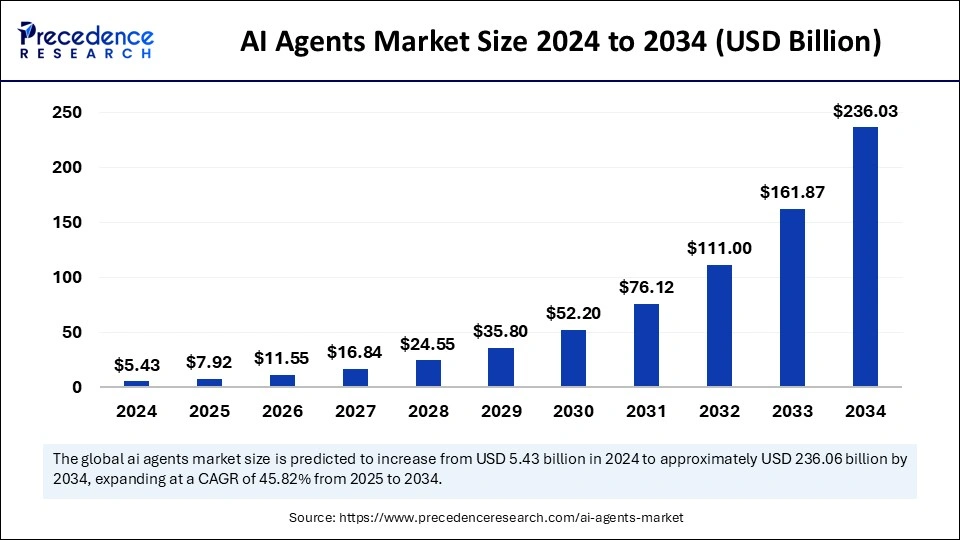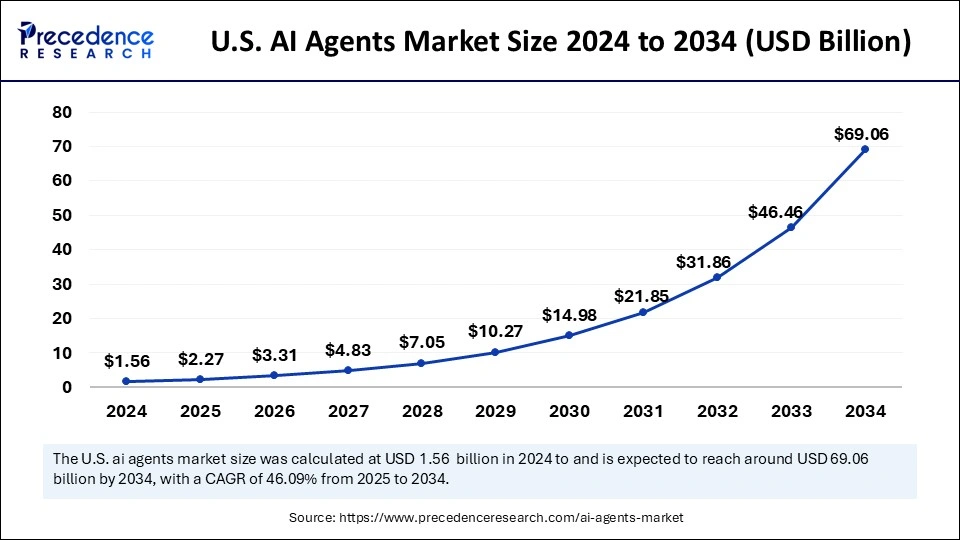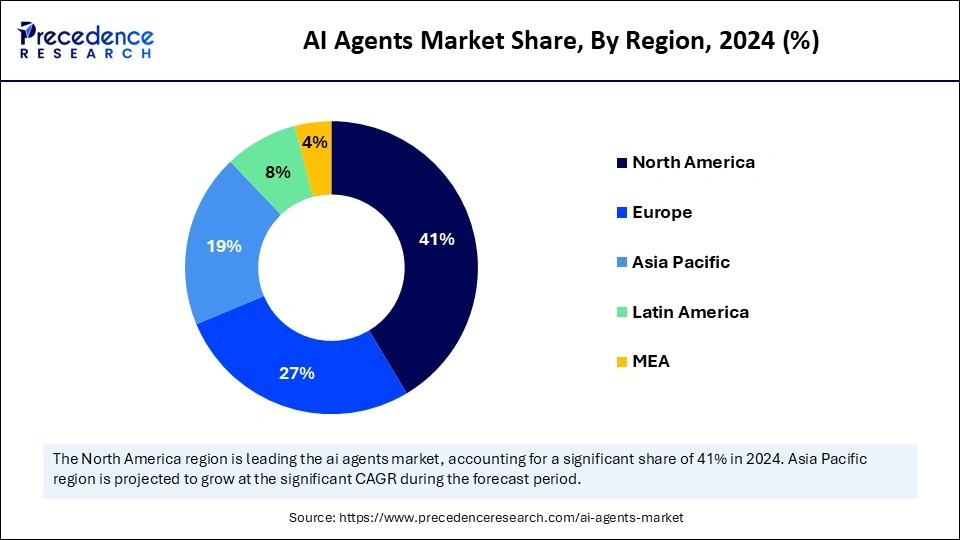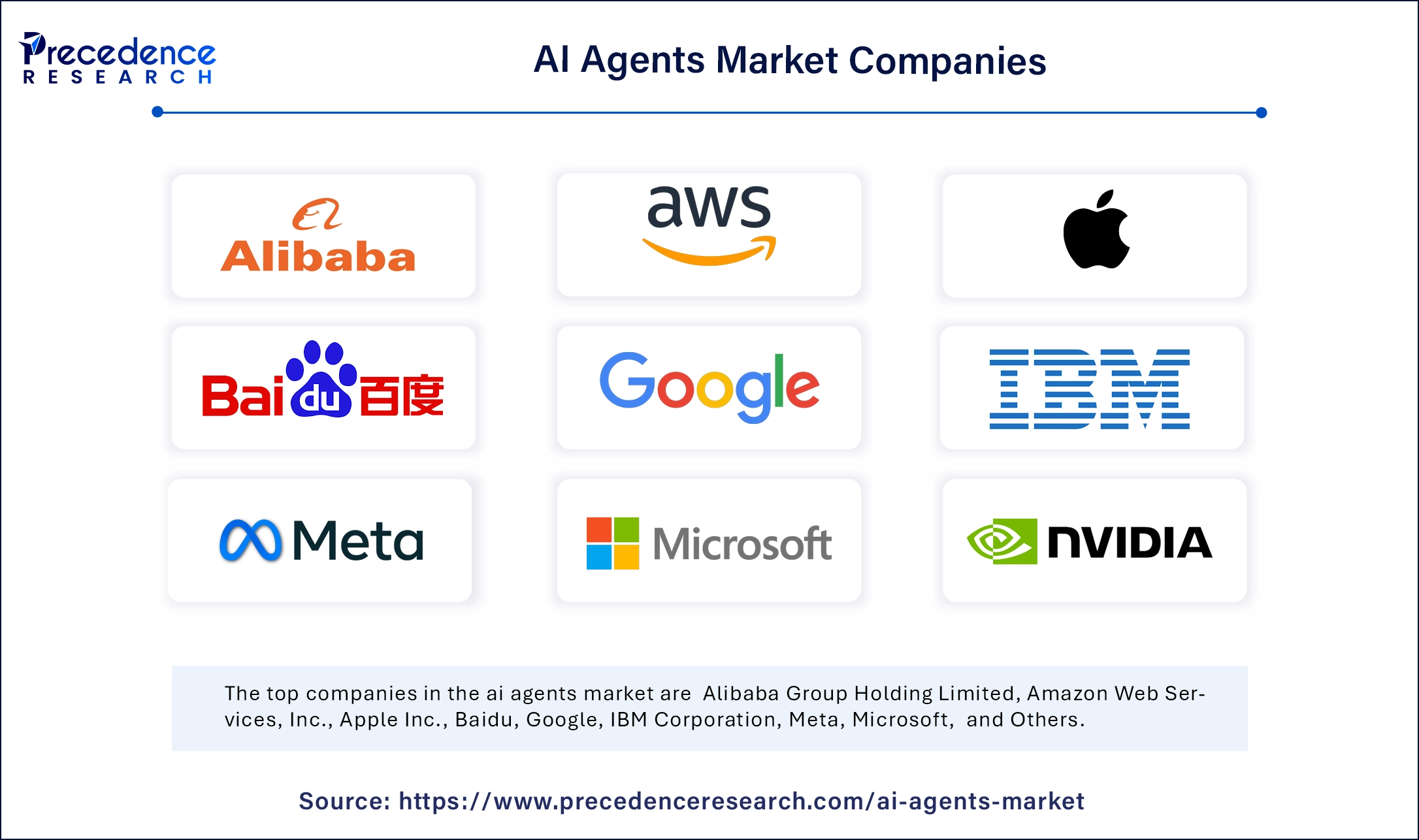March 2025
The global AI agents market size is calculated at USD 7.92 billion in 2025 and is forecasted to reach around USD 236.03 billion by 2034, accelerating at a CAGR of 45.82% from 2025 to 2034. The North America market size surpassed USD 2.23 billion in 2024 and is expanding at a CAGR of 45.97% during the forecast period. The market sizing and forecasts are revenue-based (USD Million/Billion), with 2024 as the base year.
The global AI agents market size accounted for USD 5.43 billion in 2024 and is predicted to increase from USD 7.92 billion in 2025 to approximately USD 236.03 billion by 2034, expanding at a CAGR of 45.82% from 2025 to 2034. The ongoing revolution in enterprises, with the emphasis over automation in large-scale industries is seen to promote the market s growth in the foreseen period.

Artificial intelligence agents are revolutionizing enterprise automation by adding intelligence and flexibility to everyday tasks. These agents are capable of data analysis natural language comprehension and context-aware decision-making in contrast to rule-based bots. They are being used by businesses to automate financial reporting, IT support HR onboarding, and customer service, freeing up human resources for strategic duties. Their capacity to grow and learn over time enhances enterprise workflows in the long run. Moreover, AI agents marketable cross-functional integration by connecting data and processes across departments. This results in quicker reaction times and more unified decision-making in dynamic business settings. As businesses grow AI agents market can handle intricate multistep processes with precision and efficiency intact. By revealing fresh possibilities via predictive analytics and astute suggestions their applications are also spurring innovation.
AI agents are significantly improving the experiences of both customers and employees. They contribute to increased levels of engagement and satisfaction by offering round-the-clock assistance, tailored communications, and quicker resolutions. AI agents are becoming a key component of digital transformation strategies as the business moves towards hyper-automation promoting competitive advantage and operational excellence.
The U.S. AI agents market size was exhibited at USD 1.56 billion in 2024 and is projected to be worth around USD 69.06 billion by 2034, growing at a CAGR of 46.09% from 2025 to 2034.

North America dominated the AI agents market in 2024. Leading technology companies and a firmly established digital ecosystem that encourages innovation are the main forces behind this leadership. The area gains from large R&D expenditures which promote innovative solutions that satisfy a range of business requirements. In addition, industries like retail healthcare and finance use intelligent systems to improve customer experiences, expedite processes, and maximize decision-making. North America's leadership is maintained by the ongoing development of technology and the incorporation of autonomous systems into corporate processes.
Asia Pacific is seen growing at the fastest rate in the upcoming years. The adoption of intelligent agents is fueled by the region's rapid economic development, growing efforts at digital transformation, and the need for automation. These solutions are being used by companies in manufacturing logistics and customer service to increase productivity and cut expenses. This upward growth is also facilitated by government-backed programs that encourage innovation. As businesses seek to expand their operations and improve service delivery these systems have become essential components of digital strategies propelling the market's rapid expansion.

Europe is observed to grow at a considerable growth rate in the upcoming period. Due to its strict regulations and dedication to the responsible use of technology. The European Union's strategic initiatives ensure that solutions benefit both consumers and businesses by promoting ethical research development and application. The region is home to several tech hubs that promote ongoing innovation, particularly in sectors like manufacturing healthcare, and energy. The adoption of advanced systems for sensitive applications is made more confident by Europe's emphasis on data security and privacy. The region is poised to make major progress and emerge as a major force in the global market as industries embrace automation.
The AI-agent market is experiencing rapid growth, driven by increasing demand for intelligent automation, enhanced customer experiences, and operational efficiency. These agents, which can be anything from virtual assistants to self-governing bots, are becoming more and more common in sectors like IT, healthcare, finance, and retail. AI agents market is becoming more powerful, scalable, and affordable thanks to developments in cloud computing, machine learning, and natural language processing.
As digital transformation picks up speed the market is anticipated to continue growing significantly. Real-time decision-making sentiment analysis and predictive analytics are just a few of the sophisticated tasks that AI agents market can now handle. These capabilities are being used by businesses to increase productivity and obtain a competitive advantage. Workflows are also becoming more efficient and strategic insights are being generated by the integration of the AI-agent market with CRM systems, business intelligence tools, and enterprise software.
| Report Coverage | Details |
| Market Size by 2034 | USD 236.03 Billion |
| Market Size in 2025 | USD 7.92 Billion |
| Market Size in 2024 | USD 5.43 Billion |
| Market Growth Rate from 2025 to 2034 | CAGR of 45.82% |
| Dominated Region | North America |
| Fastest Growing Market | Asia Pacific |
| Base Year | 2024 |
| Forecast Period | 2025 to 2034 |
| Segments Covered | Technology, Agent System, Type, Application, End-user, and Regions |
| Regions Covered | North America, Europe, Asia-Pacific, Latin America and Middle East & Africa |
Autonomous AI Agents with Self Learning Capabilities
Integrating self-learning algorithms into the AI agents market allows them to continuously improve and optimize their performance by analyzing past data and experiences. These agents can adjust to changing conditions by independently learning new tasks or improving current procedures. This improves decision-making skills and lessens the need for continual human oversight, especially in intricate and uncertain situations like risk management, financial forecasting, and real-time customer service. Businesses can eventually increase efficiency scalability and responsiveness by allowing the AI agents market to learn and change.
AI agents Integrating with Edge Computing
Edge computing and AI agent integration make it easier to process data locally on devices which drastically lowers latency and bandwidth consumption. This is particularly helpful for sectors where quick reactions are essential for performance and safety like driverless cars smart manufacturing and real-time healthcare monitoring. By processing data instantly without the lags that come with cloud data transfer edge AI agents market facilitate quicker decision making. Ideal for mission-critical applications in remote or data-constrained environments, this technology also improves system reliability by allowing operations to continue even with sporadic or nonexistent internet connectivity.
High Development and Maintenance Costs
The initial expenses of creating AI agents can be high and include everything from hiring specialized personnel to software development cloud infrastructure and hardware requirements. AI agents market need to be updated frequently after they are deployed to accommodate changing business needs, customer preferences, and environmental changes. Retraining models and fixing bugs are two examples of ongoing maintenance and fine-tuning that can be costly. The adoption of AI technologies may be slowed down or even restricted to large enterprises with substantial budgets due to the prohibitive costs that small and medium-sized businesses may face.
Ethical and Bias Issues
Since artificial intelligence (AI) agents can only be as objective as the data they are trained on biased decisions may arise from the fact that many datasets reflect societal biases. For example, when it comes to hiring an AI system that was trained using data from traditionally male-dominated fields might inadvertently give preference to male applications over female ones. In a similar vein racial biases in facial recognition software have been demonstrated with people of color being identified less accurately than white people. This can have major ethical ramifications for security and law enforcement.
Furthermore, attempts to identify and correct these biases are made more difficult by the opaqueness of AI decision-making which is sometimes referred to as the black box problem. Based on the data that AI agents are trained on can be passed down to them resulting in unethical decisions like discrimination in hiring or inaccurate facial recognition. Many AI models are black box in nature making it challenging to identify and rectify these biases. Further raising the possibility that AI systems will reinforce negative societal biases in the absence of regulated oversight and standardized ethical standards. To solve these problems, we need representative varied data open AI algorithms, and moral frameworks that guarantee equitable and responsible implementation across sectors.
Personalized Customer Interactions
Businesses' interactions with customers are being completely transformed by AI agents who provide personalized experiences that encourage greater engagement and enduring loyalty. AI agents market can forecast user preferences and provide tailored product recommendations discounts or support services by evaluating enormous volumes of customer data. This results in more initialized marketing campaigns and increased conversion rates in industries like retail and commerce etc. By guaranteeing prompt answers to questions AI agents market can enhance customer retention in addition to providing personalization making the entire experience more fulfilling.
Beyond the more conventional sectors like finance and customer services, AI agents are quickly expanding into new industries creating exciting new opportunities. AI agents' market can improve telemedicine, expedite administrative duties, and support diagnostics in the healthcare industry, increasing the effectiveness and accessibility of healthcare delivery. By adapting content to each student's learning style and pace AI agents marketing education can provide individualized learning experiences that benefit learners of all skill levels. Artificial intelligence agents are used in manufacturing to improve supply chain management, enhance quality control, and perform predictive maintenance. The adoption of AI agent markets is also being fueled by the growing need for automation in industries like construction logistics and agriculture. Programs like project management software inventory tracking and autonomous farming equipment can improve safety and productivity.
Machine learning segment dominated the AI agents market with the largest share in 2024. mainly because of its broad range of applications and efficiency in automating processes that have historically required human intelligence. It makes it possible for the AI agents market to examine enormous volumes of data find trends and come to well-informed conclusions without needing to be specifically programmed for every situation. Machine learning is the foundation of many AI-driven solutions ranging from fraud detection in finance to recommendation systems in e-commerce. With applications ranging from customer service to healthcare diagnostics to predictive maintenance in industrial settings machine learning's capacity to advance over time through increased data exposure guarantees that it will remain a major force behind market expansion.
Deep learning segment is expected to grow at the fastest rate in the AI agents market because of its sophisticated ability to manage sizable intricate datasets. Its capacity to handle unstructured data including audio video and image has given AI agents market new capabilities. Technologies that rely on deep learning algorithms for accuracy and dependability such as voice assistants' autonomous cars and facial recognition systems need extremely complex models. As companies keep pushing the limits of AI applications deep learning is predicted to grow quickly, especially in industries like healthcare where it can help with advanced surveillance and disease diagnosis through image analysis.
Single-agent systems segment dominated the AI agents market with the largest share in 2024. because of their effectiveness and simplicity. These systems are perfect for applications like virtual assistants automated customer support and simple process automation because they are usually made to perform specific tasks and run independently. For many companies seeking to manageably deploy AI this model is the preferred option due to its simplicity of deployment, reduced expenses, and simpler management of a single agent. Because single-agent systems are so common in various industries—from chatbots for retail customer service to automation tools for the manufacturing sector—they give companies an easy way to adopt AI-driven efficiencies.
Multi-agent systems segment is expected to grow at the fastest rate in the AI agents market especially as companies look for more intricate cooperative solutions. Multiple agents can collaborate with these systems exchanging information and organizing activities to accomplish common objectives. Multi-agent systems enable decentralized decision-making and real-time agent collaboration resulting in more reliable and scalable solutions in domains like supply chain management driverless cars and smart cities. Their quick adoption is being fueled by these systems' capacity to handle intricate dynamic issues that call for coordination between multiple components which makes them essential in sectors that require a high degree of autonomy and efficiency.
Ready-to-deploy agents segment dominated the AI agents market with the largest share in 2024. because they're readily available and simple to integrate. Businesses can quickly adopt AI-driven solutions with these pre-built systems negating the need for significant development or customization. Businesses in a variety of industries such as retail finance and customer service depend on ready-to-deploy agents to improve customer engagement and streamline operations. This market is very appealing to companies searching for quick affordable solutions to meet their operational needs because of the plug-and-play deployment convenience and tested functionality.
Build-your-own agents' segment is expected to grow at the fastest rate in the AI agents market as businesses look for more customized solutions to satisfy business needs. More flexibility and the capacity to tailor procedures to specific requirements are provided by custom-built agents. Businesses are increasingly embracing AI in a variety of applications which is driving up demand for customized systems that can grow and change to meet changing business requirements. These systems enable businesses to develop highly specialized agents for jobs like targeted marketing customized customer interactions and intricate internal workflows which propels the market's notable expansion.
Customer service and virtual assistants segment dominated the AI agents market with the largest share in 2024 mainly because these apps give companies an affordable means of enhancing customer service. AI-powered virtual assistants can do anything from scheduling management to customer service and round-the-clock assistance. Because of this companies are quickly implementing these solutions to improve customer satisfaction, speed up response times, and allocate resources as efficiently as possible. For smooth and effective customer interactions AI-driven customer service representatives are now standard in banking retail and telecommunications.
Healthcare segment is expected to grow at the fastest rate in the AI agents market driven by the growing need for intelligent systems that can support patient monitoring medical diagnostics and individualized treatment regimens. Virtual health assistants that offer medical advice automated systems for evaluating medical images and patient data management tools are just a few examples of how AI agents market is being incorporated into healthcare procedures. AI agents market provide creative solutions that can enhance care, lower errors, and expedite administrative duties in the healthcare sector which is a rapidly growing market due to growing costs and an abundance of data.
Enterprise segment dominated the AI agents market with the largest share in 2024. as companies in a variety of sectors use AI-powered solutions more frequently to improve productivity and streamline processes. Businesses use AI agents for a variety of purposes such as decision support systems, business process management, and automated customer service. Large organizations that frequently possess the resources to deploy sophisticated AI systems at scale are largely responsible for this dominance due to their extensive adoption of AI technology. To maintain their market leadership these companies are using AI agents to boost productivity, lower operating expenses, and offer individualized services.
Industrial segment is expected to grow at the fastest rate in the AI agents market. AI being used more and more by manufacturers and industrial businesses for supply chain management process automation and predictive maintenance. Artificial intelligence (AI)-powered solutions are being used to optimize production schedules, monitor machinery, and identify issues before they result in expensive repairs. The advantages AI provides in terms of increased safety cost savings and operational efficiency are driving its adoption in sectors like manufacturing logistics and energy. The market for AI agents in the industrial sector is anticipated to grow significantly as these industries continue to modernize and automate.

By Technology
By Agent System
By Type
By Application
By End-user
By Regional
For inquiries regarding discounts, bulk purchases, or customization requests, please contact us at sales@precedenceresearch.com
No cookie-cutter, only authentic analysis – take the 1st step to become a Precedence Research client
March 2025
August 2024